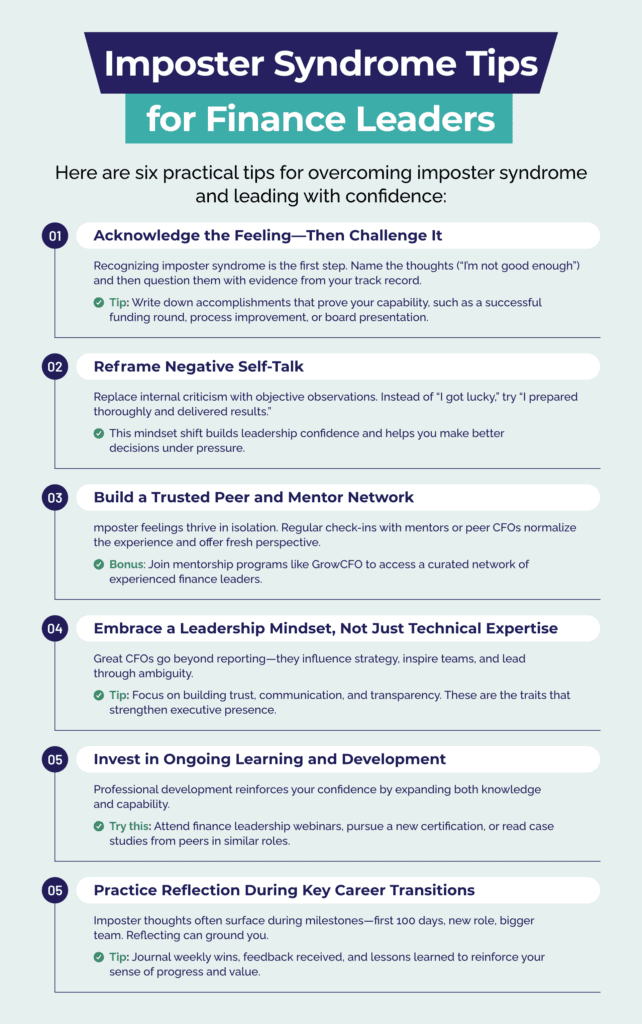How to Overcome Imposter Syndrome as a Finance Leader

What are the most effective strategies for overcoming imposter syndrome as a CFO or finance leader?
If you’ve ever asked yourself, “Do I really belong in this role?”—you’re not alone. Overcoming imposter syndrome is a common hurdle for even the most experienced finance leaders. From first-time CFOs to seasoned professionals, many struggle with self-doubt, comparison, and fear of being “found out.” But these feelings don’t define your ability—they simply reflect your growth edge. With the right mindset and support, finance leaders can build the resilience and confidence needed to thrive.
Why Imposter Syndrome Is So Common in Finance
According to experts from HealthLeaders, Psychology Today, and CFA Institute, finance leaders often carry the weight of high-stakes decisions, performance expectations, and constant change. Add a perfectionist mindset or limited representation in leadership roles—and imposter syndrome finds fertile ground.
This is especially true for:
- New CFOs stepping into boardroom visibility
- Finance professionals transitioning into strategic leadership roles
- Individuals from underrepresented backgrounds in executive positions
Imposter Syndrome Tips for Finance Leaders
Here are six practical tips for overcoming imposter syndrome and leading with confidence:

1. Acknowledge the Feeling—Then Challenge It
Recognizing imposter syndrome is the first step. Name the thoughts (“I’m not good enough”) and then question them with evidence from your track record.
✅ Tip: Write down accomplishments that prove your capability, such as a successful funding round, process improvement, or board presentation.
2. Reframe Negative Self-Talk
Replace internal criticism with objective observations. Instead of “I got lucky,” try “I prepared thoroughly and delivered results.”
✅ This mindset shift builds leadership confidence and helps you make better decisions under pressure.
3. Build a Trusted Peer and Mentor Network
Imposter feelings thrive in isolation. Regular check-ins with mentors or peer CFOs normalize the experience and offer fresh perspective.
✅ Bonus: Join mentorship programs like GrowCFO to access a curated network of experienced finance leaders.
4. Embrace a Leadership Mindset, Not Just Technical Expertise
Great CFOs go beyond reporting—they influence strategy, inspire teams, and lead through ambiguity.
✅ Tip: Focus on building trust, communication, and transparency. These are the traits that strengthen executive presence.
5. Invest in Ongoing Learning and Development
Professional development reinforces your confidence by expanding both knowledge and capability.
✅ Try this: Attend finance leadership webinars, pursue a new certification, or read case studies from peers in similar roles.
6. Practice Reflection During Key Career Transitions
Imposter thoughts often surface during milestones—first 100 days, new role, bigger team. Reflecting can ground you.
✅ Tip: Journal weekly wins, feedback received, and lessons learned to reinforce your sense of progress and value.
Mindset Shifts to Overcome Imposter Syndrome in Finance Leadership
| Limiting Belief | New Mindset | Supporting Action | Why It’s Effective |
| “I must always have the answer.” | “Strong leaders ask better questions.” | Facilitate collaborative problem-solving sessions with your team. | Encourages humility and builds psychological safety. [Jostle] |
| “If I speak up, I’ll be exposed.” | “My voice adds value, even if imperfect.” | Share ideas in meetings, even when unsure. | Builds courage and normalizes vulnerability. [Psychology Today] |
| “Others are more qualified than me.” | “I bring unique strengths to the table.” | List strengths others regularly acknowledge (e.g., strategic thinking, composure). | Reinforces self-awareness and authenticity. [CFA Institute] |
| “I don’t belong in this room.” | “I’ve earned my seat and I’m here to contribute.” | Visualize past career wins before key meetings. | Combats impostor triggers in high-stakes settings. [HealthLeaders] |
| “Perfection is the goal.” | “Progress and adaptability are signs of strength.” | Conduct post-project reviews focused on lessons learned, not just outcomes. | Builds a growth mindset and reduces fear of failure. [Asana] |
| “Asking for help means I’m weak.” | “Seeking input is a leadership skill.” | Request feedback on presentations, forecasts, or decisions. | Fosters continuous improvement and mentorship culture. [Psychology Today] |
💡 Quick Tip: Imposter syndrome fades when finance leaders anchor their confidence in reflection, not perfection.
Bonus Insight: Resilience Is Built, Not Born
Leadership isn’t about knowing everything—it’s about staying grounded, open to feedback, and committed to growth. According to Jostle and HealthLeaders, creating a feedback-rich environment and collaborating across departments are powerful ways to demonstrate both confidence and humility.
Final Thought
Overcoming imposter syndrome isn’t about “fixing” yourself—it’s about remembering who you already are. With the right support system, mindset, and tools, you can lead with purpose, presence, and confidence—even when doubt whispers otherwise. And that’s what makes a truly resilient CFO.
Ready to Ditch the Doubt?
GrowCFO’s mentoring program matches finance professionals with senior CFO mentors who’ve faced imposter syndrome—and learned how to lead through it. Whether you need confidence, clarity, or career support, our mentors are here to help.
Start building your leadership confidence with our GrowCFO mentoring program.




